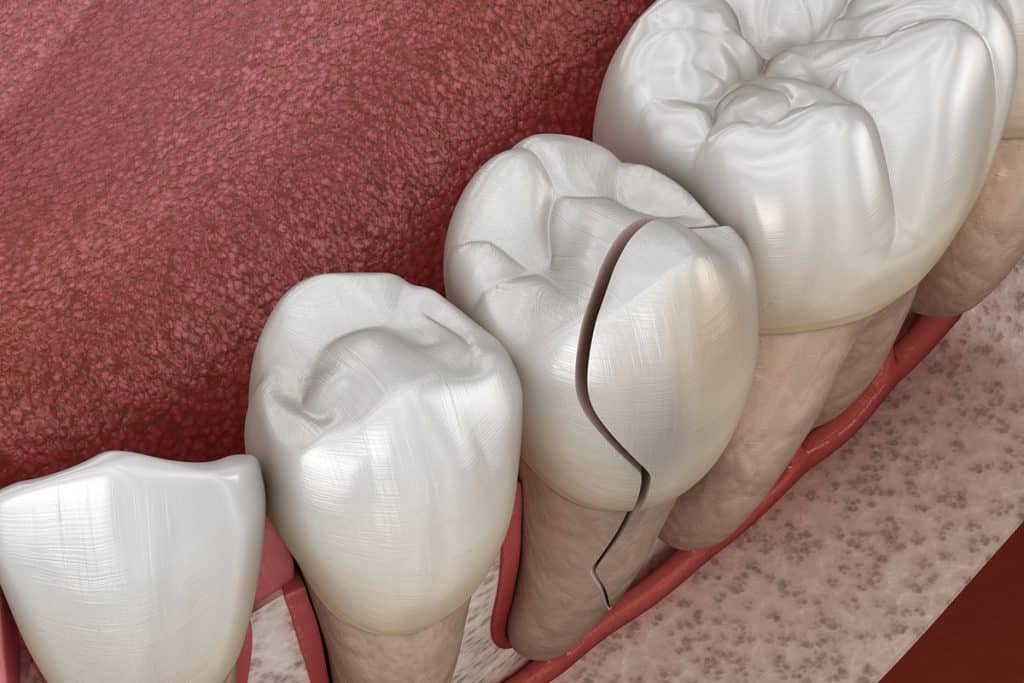5 Signs You Cracked a Tooth

Your smile is one of your most valuable assets, and it's important to take care of it. While we all know the basics of good dental hygiene, many people are unaware of the signs that their tooth might be cracked. Ignoring a cracked tooth can lead to serious dental problems down the line, so it's crucial to be aware of the warning signs.
In this article, we'll take a closer look at the five signs that your tooth may be cracked, and what you can do to protect your smile. From avoiding certain foods to visiting your dentist regularly, there are steps you can take to ensure that your teeth stay healthy and strong. So, if you want to keep your smile looking its best, read on to learn more about how to protect your teeth from cracking.
How to Tell if Your Tooth Is Cracked
- Pain when chewing or biting
- Sensitivity to hot and cold temperatures
- Swollen or tender gums
- Visible crack or chip in the tooth
- Changes in the bite or tooth alignment
A cracked tooth can be difficult to detect, as the symptoms can be subtle. However, there are a few signs that you can look out for.
The first is pain when biting or chewing. If you experience pain when you bite down on food or chew, it could be a sign that your tooth is cracked. Another sign is sensitivity to hot or cold temperatures. If you feel a sharp pain or discomfort when you consume hot or cold drinks or food, it could be a sign that your tooth is cracked. You may also experience swelling or inflammation of the gums around the affected tooth. If you notice any of these symptoms, it's important to visit your dentist as soon as possible to determine if your tooth is cracked.
There are a few different types of tooth cracks, including craze lines, vertical cracks, and split teeth.
- Craze lines are tiny cracks that only affect the surface of the tooth and don't require treatment.
- Vertical cracks are more serious and can extend from the chewing surface of the tooth down towards the root.
- Split teeth are the most severe type of tooth crack, and occur when the tooth has split completely in two.
If you suspect that your tooth is cracked, your dentist will be able to determine the type and severity of the crack.
The Dangers of Ignoring a Cracked Tooth
Ignoring a cracked tooth can lead to serious dental problems down the line. If left untreated, a cracked tooth can become infected and lead to an abscess, which can be painful and require root canal treatment.
In some cases, a cracked tooth may need to be extracted. Ignoring a cracked tooth can also lead to further damage to the tooth or surrounding teeth. It's important to address a cracked tooth as soon as possible to prevent further damage and ensure the best possible outcome.
Causes of Tooth Cracks
There are several causes of tooth cracks, including:
- Biting down on hard objects such as ice or hard candy
- Trauma to the face or mouth
- Bruxism, or teeth grinding
- Large fillings that weaken the tooth structure
- Age-related wear and tear
While some of these causes can be avoided, others are out of our control. However, there are steps you can take to protect your teeth from cracking.
The best way to prevent tooth cracks is to practice good dental hygiene, including regular brushing and flossing. It's also important to avoid biting down on hard objects such as ice or hard candy. If you grind your teeth at night, your dentist may recommend a mouthguard to protect your teeth. If you have large fillings that weaken the tooth structure, your dentist may recommend a crown to provide additional support. It's also important to visit your dentist regularly for check-ups and cleanings, as they can detect and treat tooth cracks before they become more serious.
Treatment Options for Tooth Cracks
The treatment for a cracked tooth will depend on the type and severity of the crack. If the crack is minor, your dentist may simply smooth out the tooth's surface.
If the crack is more severe, your dentist may recommend a filling or crown for additional support. Sometimes, a root canal may be necessary to remove infected tissue from the tooth. If the crack is too severe, the tooth may need to be extracted and replaced with an implant or bridge.
If you suspect that your tooth is cracked, it's important to visit your dentist as soon as possible. Your dentist will be able to determine the type and severity of the crack, and recommend the appropriate treatment. Even if you don't have any symptoms, it's still a good idea to visit your dentist regularly for check-ups and cleanings to detect and treat any potential tooth cracks before they become more serious.
Cracked Teeth Treatment in Temple
By being aware of the signs of a cracked tooth and taking steps to prevent tooth cracks, you can protect your teeth and keep your smile looking its best.If you suspect that your tooth is cracked, don't ignore it. Visit your dentist as soon as possible to determine the type and severity of the crack and ensure the best possible outcome. To learn more or to schedule an appointment, contact us at 254-778-4400.

